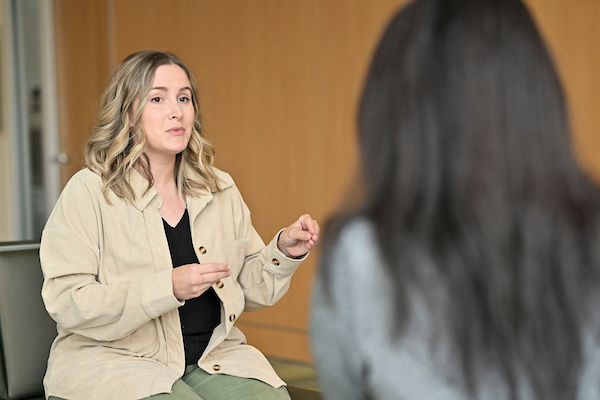Media contact:
 Phase II of the WE CARE grant will focus on providing support and helping them learn to manage stress and respond compassionately to others in distress.The University of Alabama at Birmingham School of Nursing will now be the focus of Phase II of the three-year, $2.3 million grant under the Workforce Engagement for Compassionate Advocacy, Resilience and Empowerment program.
Phase II of the WE CARE grant will focus on providing support and helping them learn to manage stress and respond compassionately to others in distress.The University of Alabama at Birmingham School of Nursing will now be the focus of Phase II of the three-year, $2.3 million grant under the Workforce Engagement for Compassionate Advocacy, Resilience and Empowerment program.
Phase 1 of the WE CARE grant has been providing wellness services to nurses at UAB Medicine for more than a year. It was awarded in 2022 to Patricia A. Patrician, Ph.D., the Rachel Z. Booth Endowed professor in the UAB School of Nursing by the Health Resources and Services Administration.
“The COVID-19 pandemic put an additional strain on nurses,” Patrician said. “This grant and the resources it allowed us to provide are making a real impact on helping nurses deal with some difficult circumstances — like making sure they have additional support dealing with the aftermath of patient deaths, episodes of violence and general work stressors they deal with on a daily basis. Over the past year that we have been working with the hospital nursing staff, we have seen improvements in several indicators of well-being.”
The WE CARE grant has enabled the program to hire nursing professional development specialists to receive additional training in resilience and psychological first aid, and a nurse wellness manager to provide individualized support services exclusively to nurses at UAB Medicine.
As the grant turns its efforts to the school of nursing, the team now includes psychiatric mental health nurse practitioner Laura Woodward and social worker Sarah Swatzell to collaborate with UABSON students, faculty and staff to provide support and help them learn to manage stress and respond compassionately to others in distress.
“No issue is too large or small for me to address, whether it is through providing a safe space for a conversation or referring someone to specialized services,” said Swatzell.
Swatzell is available to provide support for food insecurity, housing and utility/bill assistance, health and mental health concerns, crisis intervention, interpersonal relations and communication, and student/staff advocacy.
 Sarah Swatzell“College can be a very stressful time for students, and those who are struggling to meet their basic needs may have a much harder time being successful in their education,” Swatzell said. “I want to help students access resources and advocate for themselves.”
Sarah Swatzell“College can be a very stressful time for students, and those who are struggling to meet their basic needs may have a much harder time being successful in their education,” Swatzell said. “I want to help students access resources and advocate for themselves.”
Swatzell also will give presentations in classes and to faculty and staff groups to raise awareness of the support and services available.
“It is really a journey of support and collaboration,” Swatzell said.
After partnering with UAB Medicine in the grant’s first year and supporting UABSON the second year, the goal of Phase III of the WE CARE grant will be to expand support, training and resources to nurses throughout Alabama.
“Providing these resources to all nurses in the state, many of whom live and work in low-resources, rural counties, can make a big impact in helping nurses function at their very best and, as a result, improve the quality of patient care they deliver,” Patrician said. “After all, nurses are the backbone of the health care system.”